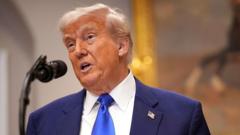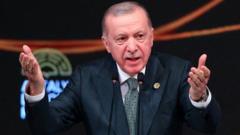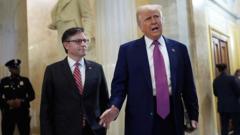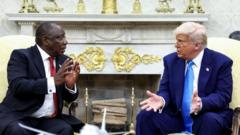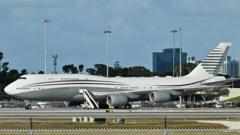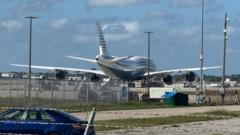NATO allies are embracing a significant shift in their military budgeting strategies, motivated by calls from former President Trump for increasing defense spending.
**NATO’s New Spending Strategy: Addressing Trump’s Demands with Innovative Solutions**

**NATO’s New Spending Strategy: Addressing Trump’s Demands with Innovative Solutions**
As NATO re-evaluates defense expenditures, European leaders consider unconventional spending avenues to accommodate U.S. pressure.
In recent months, European NATO members have confronted the challenge of meeting Trump's demand for 5% of national income to fund defense initiatives. Initially dismissed as unrealistic, this target is now being approached through innovative financial strategies that redefine defense-related expenditures.
A consensus among some NATO countries has emerged to augment military spending guidelines, setting a goal of 3.5% of GDP for traditional military costs and an additional 1.5% for nontraditional defense expenditures by 2032. These unconventional expenses may encompass infrastructure improvements for military logistics, advancements in cybersecurity, and cutting-edge technology enhancements for military operations.
The NATO Secretary-General, Mark Rutte, emphasized the importance of comprehensive defense spending enablers during discussions with foreign ministers in Turkey, referring to the necessity of ensuring infrastructure safety for defense logistics.
With Trump’s previous admonishments highlighting potential reductions in U.S. support for European security, several member countries have opted to shoulder more financial responsibility in hopes of maintaining a vital alliance. The future of NATO’s financial strategies reflects not only current geopolitical realities but also innovative methods of addressing longstanding budgetary constraints.
A consensus among some NATO countries has emerged to augment military spending guidelines, setting a goal of 3.5% of GDP for traditional military costs and an additional 1.5% for nontraditional defense expenditures by 2032. These unconventional expenses may encompass infrastructure improvements for military logistics, advancements in cybersecurity, and cutting-edge technology enhancements for military operations.
The NATO Secretary-General, Mark Rutte, emphasized the importance of comprehensive defense spending enablers during discussions with foreign ministers in Turkey, referring to the necessity of ensuring infrastructure safety for defense logistics.
With Trump’s previous admonishments highlighting potential reductions in U.S. support for European security, several member countries have opted to shoulder more financial responsibility in hopes of maintaining a vital alliance. The future of NATO’s financial strategies reflects not only current geopolitical realities but also innovative methods of addressing longstanding budgetary constraints.


